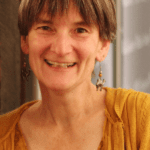I worked on dis.chord as my thesis for the University of Guelph-Humber’s MFA in Creative Writing program, and the awesome Russell Smith served as my advisor. The structure, support and accountability of that mentorship was immensely helpful. It also helped to have an objective voice to help with the often isolating work of organizing an imaginary world! However when I finished, I found there were big questions left lingering about the format that I needed time to digest. Coming back to the project and those questions through the DD mentorship (that comes with a timeline that isn’t self-imposed) gives me confidence in my ability to resolve the issues with structure and narrative.
dis.chord started as a voice in my head: Astra Hallet, the main character, prompting me to reconcile issues that I saw as themes in the mental health system. I started organizing that voice as a series of poems, which I workshopped in the MFA program. Then I felt the need to give other voices and perspectives to understand that character, and so it became a multi-voice novel. I was looking for an editor to reconcile some questions I’d had about this work when I found out about DD’s mentorship program. Here I am!
I’m fascinated by works that use both poetry and prose. When do you choose one over the other? I chose to share the between 5 unique first person voices in an attempt to show the story from a number of angles. 4 of them are prose, and the main character’s sections are mostly poems. I think poetry gives an angle and attention to language/syntax that can’t quite be represented in another format . . . or that’s my current hypothesis anyway.
I was most productive with my writing when I read and wrote every morning no matter what. When I thought of it as a ritual, not a routine—one I was adamant to protect. I also took time off (to travel, to be alone) while coming to the end of big writing projects so I could immerse myself completely in the story and make it my sole concern.
If I were the ruler of a perfect world, writers would know their work was meaningful and would have myriad viable sources of income. One of the ways I’d make that possible would be to mandate contemporary Canadian literature in Canadian classrooms.
Chuck Klosterman would be the author I’d choose to write about my life. Only he could do justice to my twenties.
I hope the lowest point in my writing is over—which is that I took a long period away from writing to build a career and financially stable life. It was a low point to realize I had to make big life changes in order to create protected time—hours and days each week to write—again. Ideally in 10 years I have a viable source of income that is flexible, allows me that time and space to write every day, and the ability to buy ridiculous amounts of books. The highlight would be my work being discussed in classrooms.

